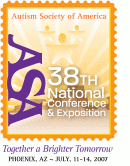 |
The ASA's 38th National Conference on Autism Spectrum Disorders (July 11-14, 2007) of ASAThe Westin Kierland Resort & Spa, Scottsdale, AZ |
| For a complete author index with session numbers, please click here | |
| Thursday, July 12, 2007: 10:45 AM-12:00 PM | |||
| Herberger Ballroom 5 & B | |||
| #2558- THE Nature, Cause, And A New Scale To Diagnose Autism and Asperger's Disorder- ASHA CEU Session | |||
| There will be three separate presentations:
1) The Nature and Cause of Autism and Asperger’s Disorder: An overview of author’s clinical and research findings, and what they consider to be the basic brain problems, the core symptoms, and the cause of autism and Asperger’s disorder will be presented. ( 45 minute presentation, 30 minute question and answer period).
2) A Diagnostic Scale for Autism and Asperger’s Disorder (the RAADS). This current research paper will be presented. (45 minutes presentation, 30 minute question and answer period)
3) Clinical Evidence that Asperger’s Disorder is a Mild Form or Autism. This current research paper will be presented. (45 minute presentation, 30 minute question and answer period)
| |||
| Presenters: | - Dr. Ritvo is a clinical instructor at the Yale Child study Center and the director of the Ritvo Clinic. She has conducted autism and Asperger's Disorder research projects for over 20 years, has published numerous scientific articles and presented internationally to over 20 scientific organizations on these topics.Recently, she developed a diagnostic instrument for adults with AS and autism-the RAADS. A complete CV is available if requested.
- FORMER CHAIRMAN OF THE PROFESSIONAL ADVISORY BOARD OF ASA FOR 10 YEARS, AND MEMBER FOR OVER 25 YEARS. AUTHOR OF OVER 100 SCIENTIFIC PAPERS ON AUTISM AND ASPERGER'S DISORDER, ON DSM IV COMMITTEE THAT WROTE THE DEFINITIONS OF AUTISM. AUTHOR OF SEVERAL BOOKS ON AUTISM. - Max Joseph Ritvo is a student, a social skills group facilitator, a co -investigator in ongoing research autism and AS research projects. Most recently, he participated in the development of the RAADS, a diagnostic instrument for adults with autism and AS. | ||
|
| |||
|
CONFERENCE PROGRAM DESCRIPTION There will be three separate presentations: 1) The Nature and Cause of Autism and Asperger's Disorder: An overview of author's clinical and research findings, and what they consider to be the basic brain problems, the core symptoms, and the cause of autism and Asperger's disorder will be presented. ( 45 minute presentation, 30 minute question and answer period). 2) A Diagnostic Scale for Autism and Asperger's Disorder (the RAADS). This current research paper will be presented. (45 minutes presentation, 30 minute question and answer period) 3) Clinical Evidence that Asperger's Disorder is a Mild Form or Autism. This current research paper will be presented. (45 minute presentation, 30 minute question and answer period)
SESSION CONTENT PLAN – ABSTRACTS OF THE TWO RESEARCH PAPERS TO BE PRESENTED A DIAGNOSTIC SCALE FOR AUTISM AND ASPERGER'S DISORDER IN ADULTS OBJECTIVE: Development of a self-administered scale assisting clinicians in diagnosing adults with Autism and Asperger's Disorder. METHODS: A new 78 item self scoring scale based on DSM IV-TR-TR and ICD-10 criteria was administered to 17 Autistic and 20 Asperger's Disorder patients, 41 comparison subjects without a DSM IV-TR disorder, and 14 with another DSM IV-TR Axis I disorder. RESULTS: The Autistic and Asperger's groups scored significantly higher than comparison groups. Scores did not overlap and internal Sensitivity, specificity and content validity was perfect (no false positives, no false negatives). Cronbach Alpha coefficients of internal consistency of three subscales were satisfactory. Gender and Age and diagnostic categories were not significantly associated factors. CONCLUSIONS: This highly sensitive and specific scale is a useful clinical tool that can assist in the differential diagnosis of Autism and Asperger's disorder in adults. It can be administered and scored in less than an hour. CLINICAL EVIDCE THAT ASPERGER'S DISORDER IS A MILD FORM OF AUTISM OBJECTIVE: To test the hypothesis that Asperger's Disorder is a mild form of autism, METHOD a 78-item scale was administered to 17adults with autism and 20 with Asperger's Disorder. RESULTS; 1) The mean number of symptoms scored “present now and when I was young”, “only present now”, and “only present when I was young” was not significantly different between the subject groups. 2) Asperger's Disorder subjects had the same symptoms as the autistic subjects, but answered significantly more often “these (symptoms) were never true, indicating that they have a milder clinical course. CONCLUSIONS The data support hypothesis that Asperger's Disorder is a mild form of Autism and the corollary hypothesis that they share a common developmental neuropathology. Therefore, it appears reasonable that Asperger's Disorder and Autism be incorporated into one diagnostic category such as, “Autism Spectrum Disorder, (severe, moderate, Asperger's type)”. |
|||
See more of General Submissions
See more of The ASA's 38th National Conference on Autism Spectrum Disorders (July 11-14, 2007)